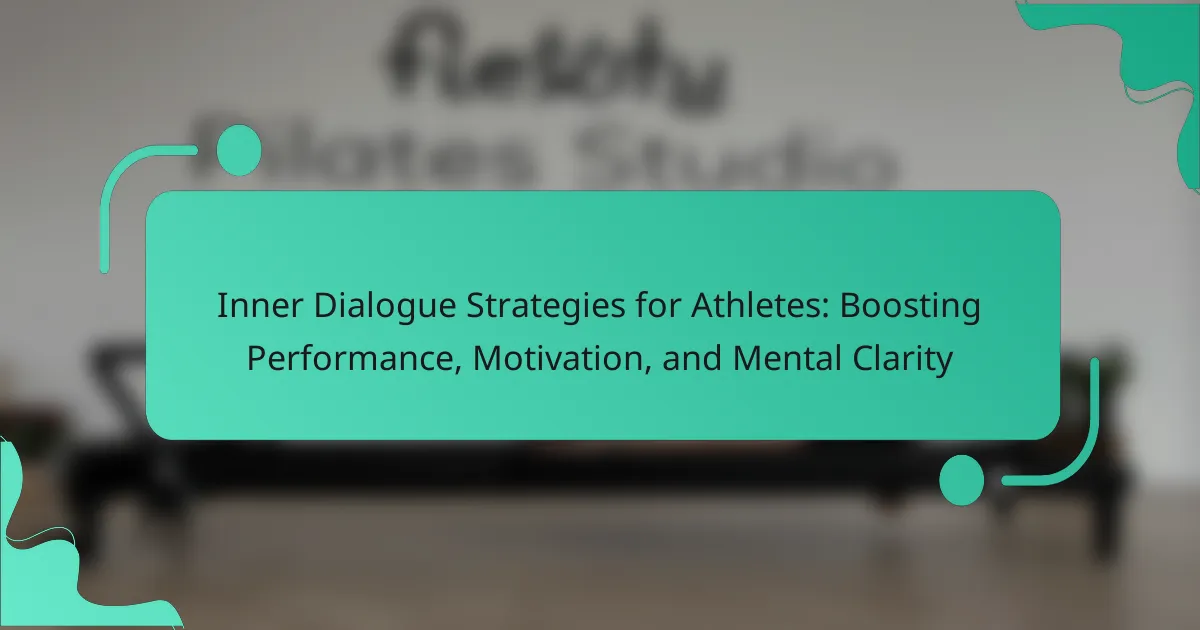Inner dialogue strategies for athletes significantly enhance performance, motivation, and mental clarity. Key techniques include positive self-talk to boost confidence, visualization for mental rehearsal, and mindfulness to reduce anxiety. These methods foster resilience and focus, ultimately leading to improved athletic outcomes. Tailoring these strategies to specific sports and maintaining a routine for reflection can further optimize results.

What are Inner Dialogue Strategies for Athletes?
Inner dialogue strategies for athletes enhance performance, motivation, and mental clarity. Techniques such as positive self-talk, visualization, and mindfulness significantly impact an athlete’s mindset. Positive self-talk involves affirmations that boost confidence and focus. Visualization allows athletes to mentally rehearse their performance, improving execution. Mindfulness cultivates present-moment awareness, reducing anxiety and enhancing concentration. Implementing these strategies can lead to improved outcomes in competitive settings.
How does inner dialogue impact athletic performance?
Inner dialogue significantly enhances athletic performance by improving focus, motivation, and mental clarity. Positive self-talk can reduce anxiety and foster resilience during competition. Research indicates that athletes who engage in constructive inner dialogue experience higher levels of confidence and better performance outcomes. Techniques such as visualization and affirmations further amplify these effects, creating a unique mental environment conducive to peak performance.
What role does motivation play in inner dialogue?
Motivation significantly influences inner dialogue by shaping an athlete’s mindset and performance. Positive self-talk enhances confidence and focus, while negative thoughts can hinder progress. Techniques like visualization and affirmations can strengthen motivation, creating a supportive internal environment. This ultimately leads to improved mental clarity and performance outcomes.
How can mental clarity enhance sports performance?
Mental clarity significantly enhances sports performance by improving focus, decision-making, and emotional regulation. Athletes with clear mental states can better analyze game situations, respond swiftly, and maintain composure under pressure. This clarity fosters a positive inner dialogue, which boosts motivation and confidence. As a result, athletes experience improved training outcomes and competitive results.

What are the universal benefits of effective inner dialogue?
Effective inner dialogue enhances athletes’ performance by fostering motivation, mental clarity, and focus. Positive self-talk leads to improved resilience and confidence during competitions. Studies show that athletes who engage in constructive inner dialogue experience reduced anxiety and enhanced concentration, allowing for better execution of skills. This mental strategy supports goal setting and reinforces a growth mindset, contributing to overall athletic success.
How does positive self-talk influence performance?
Positive self-talk significantly enhances performance by boosting motivation and mental clarity. Athletes who engage in positive inner dialogue experience increased confidence, reduced anxiety, and improved focus during competitions. Research shows that positive affirmations can lead to better outcomes by reinforcing a growth mindset. As a result, athletes are more likely to push through challenges and maintain resilience under pressure.
What are the psychological advantages of structured inner dialogue?
Structured inner dialogue offers psychological advantages that enhance focus, resilience, and self-awareness in athletes. It fosters a positive mindset, which can lead to improved performance and motivation. By engaging in intentional self-talk, athletes can clarify goals and reinforce commitment, resulting in increased mental clarity. This strategy can also reduce anxiety and build confidence, enabling athletes to perform under pressure.
How can athletes develop resilience through inner dialogue?
Athletes can develop resilience through inner dialogue by practicing positive self-talk and reframing negative thoughts. This approach enhances mental clarity, motivation, and performance under pressure. Engaging in constructive inner dialogue allows athletes to focus on their strengths and visualize success. Research indicates that athletes who employ these strategies experience improved coping mechanisms during challenging situations.

What unique strategies can athletes employ for effective inner dialogue?
Athletes can enhance their performance through unique inner dialogue strategies such as positive self-talk, visualization, and mindfulness techniques. Positive self-talk involves affirmations that reinforce confidence and focus. Visualization allows athletes to mentally rehearse their performance, enhancing muscle memory and reducing anxiety. Mindfulness techniques, like deep breathing, help maintain mental clarity and reduce distractions during competition. Each strategy contributes to improved motivation and focus, ultimately leading to better athletic outcomes.
What are the most effective affirmations for athletes?
Effective affirmations for athletes include phrases that enhance focus, boost motivation, and reinforce mental resilience. Examples are “I am strong and capable,” “I embrace challenges,” and “I perform at my best under pressure.” These affirmations promote a positive inner dialogue, essential for peak performance. Regular repetition can lead to improved mental clarity and confidence, ultimately enhancing athletic success.
How can visualization techniques enhance inner dialogue?
Visualization techniques significantly enhance inner dialogue by enabling athletes to mentally rehearse performance scenarios. This practice fosters motivation and boosts mental clarity, allowing athletes to visualize success and refine their strategies. Engaging in vivid imagery can create a positive feedback loop, reinforcing confidence and focus during training and competition. As a result, athletes often experience improved performance outcomes and a stronger mental framework.
What role do specific mantras play in athletic performance?
Specific mantras enhance athletic performance by fostering focus, boosting motivation, and improving mental clarity. They serve as powerful inner dialogue strategies that athletes can use to manage stress and maintain a positive mindset. For example, repeating phrases like “I am strong” can reinforce confidence, while “Stay present” helps maintain concentration during competition. Research indicates that athletes who employ mantras experience reduced anxiety and improved endurance. The unique attribute of mantras lies in their personalized nature; each athlete can select phrases that resonate with their individual goals and challenges, making them effective tools for performance enhancement.

What rare inner dialogue techniques can athletes explore?
Athletes can explore rare inner dialogue techniques such as visualization scripting, where they articulate their performance in detail, and cognitive restructuring, which involves reframing negative thoughts into positive affirmations. These methods enhance focus and resilience. Another technique is self-compassion dialogue, promoting a supportive inner voice that encourages growth rather than criticism. Lastly, athletes may benefit from mindfulness-based self-talk, which fosters present-moment awareness and reduces anxiety during competition.
What is the impact of narrative coaching on athletes?
Narrative coaching significantly enhances athletes’ performance, motivation, and mental clarity. It helps athletes reshape their inner dialogue, fostering a positive mindset and resilience. By integrating personal stories, athletes can connect emotionally to their goals, improving focus and commitment. This approach facilitates self-awareness, enabling athletes to identify and overcome mental barriers. As a result, athletes experience increased confidence and enhanced overall performance.
How can athletes use storytelling in their inner dialogue?
Athletes can enhance their performance by using storytelling in their inner dialogue. This technique allows them to create positive narratives that boost motivation and mental clarity. By framing challenges as stories of growth, athletes can shift their mindset, fostering resilience and focus. For example, visualizing past successes can reinforce confidence, while reimagining setbacks as learning experiences promotes perseverance. Engaging in this narrative practice cultivates a stronger mental framework, essential for peak performance in competitive environments.
What uncommon practices can enhance mental clarity?
Practices such as visualization, mindfulness meditation, and positive self-talk can significantly enhance mental clarity for athletes. Visualization helps create mental images of success, improving focus and performance. Mindfulness meditation fosters present-moment awareness, reducing distractions. Positive self-talk boosts motivation and confidence, leading to clearer thinking. These strategies can lead to improved athletic performance and mental resilience.

How can athletes tailor their inner dialogue strategies for specific sports?
Athletes can tailor inner dialogue strategies by aligning them with the specific demands and mental challenges of their sport. For example, a sprinter may focus on short, powerful affirmations to enhance speed, while a marathon runner might use longer, motivational phrases to maintain endurance.
Additionally, athletes can incorporate visualization techniques, imagining successful performances, which boosts confidence and mental clarity. Practicing mindfulness can help athletes stay present, reducing anxiety before competitions.
Finally, adjusting the tone of self-talk is crucial; positive reinforcement can be more effective in sports requiring creativity, like gymnastics, while direct, assertive language may benefit high-pressure sports, such as basketball.
What adjustments should athletes make for team versus individual sports?
Athletes should adapt their inner dialogue strategies based on whether they compete in team or individual sports. Team athletes benefit from fostering communication and collaboration, while individual athletes should focus on self-motivation and personal accountability.
Team athletes can enhance performance by using collective affirmations and supportive self-talk to build camaraderie. They might emphasize phrases that promote unity, such as “We can achieve this together.” In contrast, individual athletes should cultivate a strong internal monologue that reinforces personal goals, employing statements like “I am capable of overcoming challenges.”
Additionally, team athletes may need to navigate varying dynamics and feedback from teammates, which can influence their mental clarity. Individual athletes, however, often face the challenge of self-doubt and require strategies that bolster their confidence and resilience.
Overall, tailoring inner dialogue to the specific demands of team or individual sports can significantly impact motivation and performance outcomes.
How can sport-specific challenges influence inner dialogue?
Sport-specific challenges can significantly enhance inner dialogue by fostering resilience and focus. Athletes often face unique pressures that shape their self-talk, impacting performance and motivation. Engaging in sport-specific challenges encourages athletes to develop positive affirmations and constructive self-criticism, which can lead to improved mental clarity. For instance, a runner may use inner dialogue to visualize success and manage anxiety during competition. This tailored approach to inner dialogue not only boosts confidence but also helps athletes navigate the mental demands of their sport effectively.

What are best practices for implementing inner dialogue strategies?
To implement inner dialogue strategies effectively, athletes should focus on clarity, consistency, and positive reinforcement. Begin by identifying specific performance goals to guide the inner dialogue. Use visualization techniques to create mental scenarios that reinforce desired outcomes. Regularly practice self-talk that emphasizes strengths and past successes, fostering motivation and confidence. Additionally, maintain a routine for reflection and adjustment of inner dialogue to adapt to changing circumstances and challenges. This approach enhances mental clarity and overall performance.
How can athletes track their progress with inner dialogue?
Athletes can track their progress with inner dialogue by using positive affirmations and structured self-talk. This approach boosts motivation, enhances focus, and clarifies performance goals. Athletes should regularly assess their internal dialogue to identify patterns, adjusting their mindset to foster resilience and confidence. By setting specific mental benchmarks, they can measure improvements in their performance and mental clarity over time.
What common mistakes should athletes avoid in their inner dialogue?
Athletes should avoid negative self-talk, unrealistic expectations, and comparisons to others. These common mistakes can hinder performance and motivation. Instead, focus on constructive and supportive inner dialogue. Positive affirmations and realistic goal-setting enhance mental clarity and resilience.
What expert insights can enhance inner dialogue effectiveness?
To enhance inner dialogue effectiveness, athletes should focus on positive self-talk and visualization techniques. These strategies foster motivation and mental clarity, leading to improved performance. Research indicates that positive affirmations can significantly reduce anxiety and enhance focus. Additionally, incorporating mindfulness practices helps athletes maintain present-moment awareness, further refining their inner dialogue.
